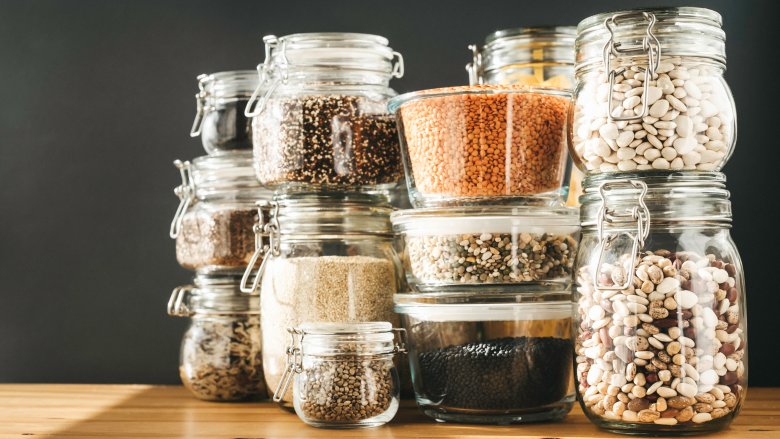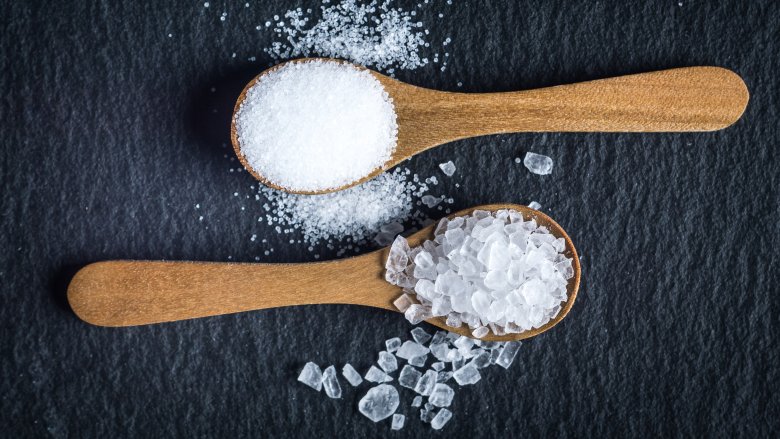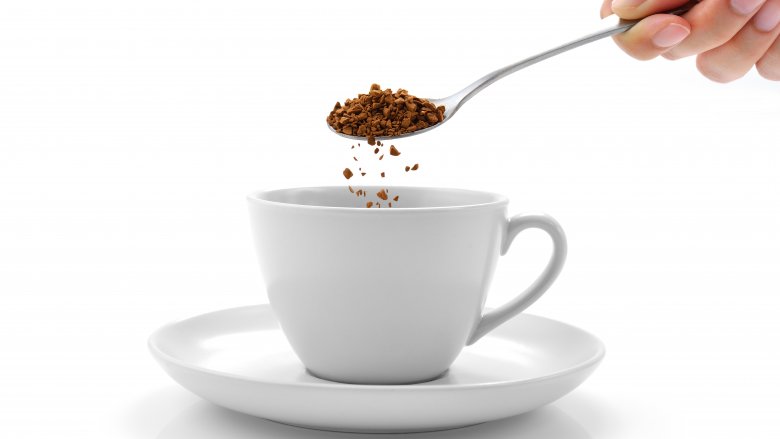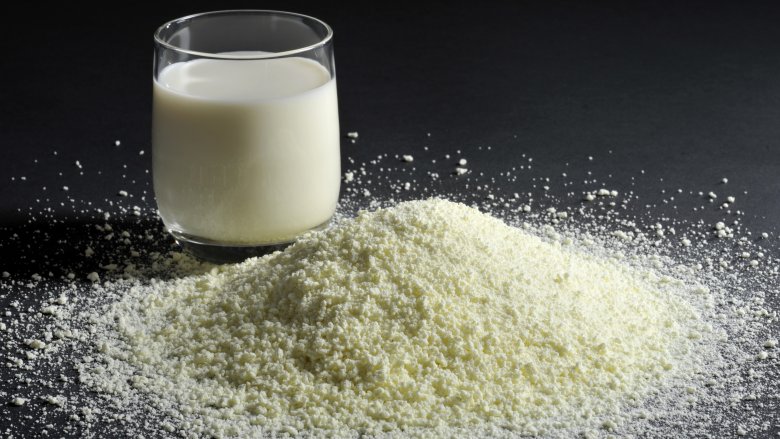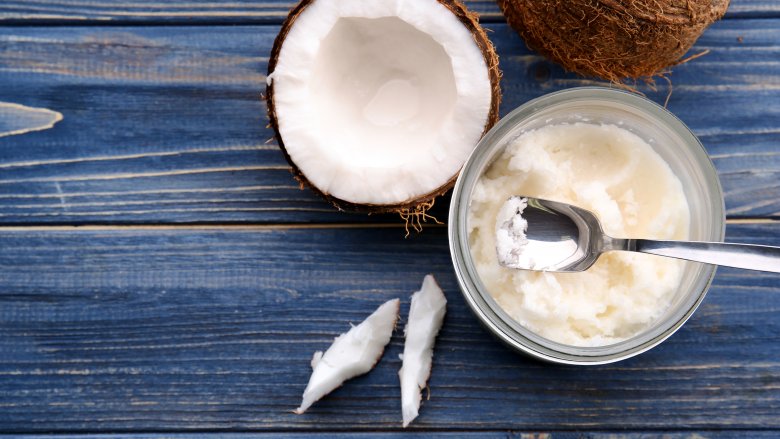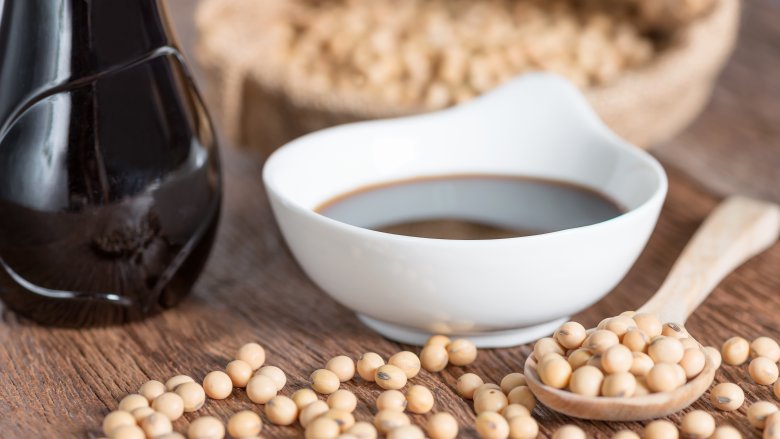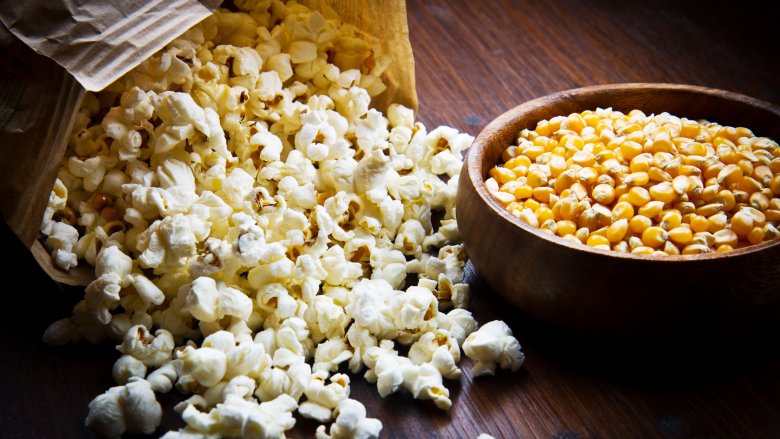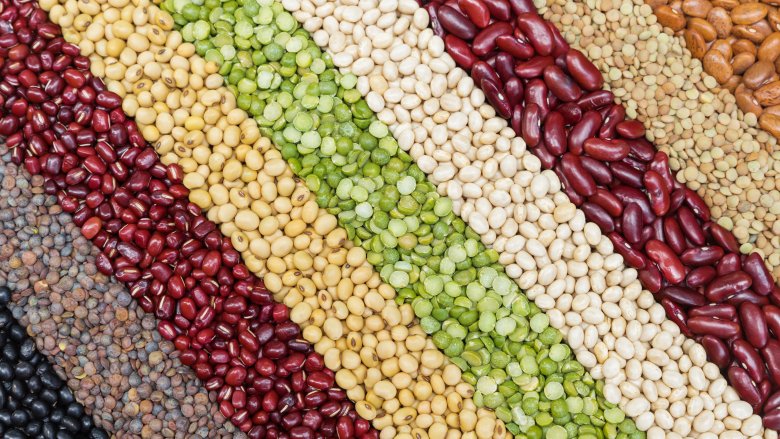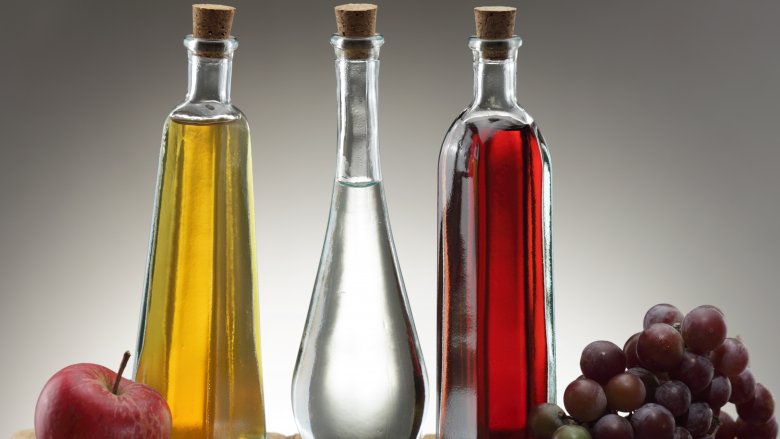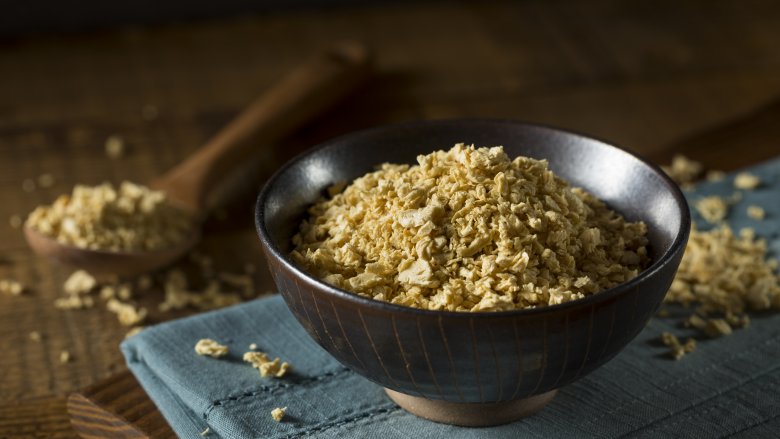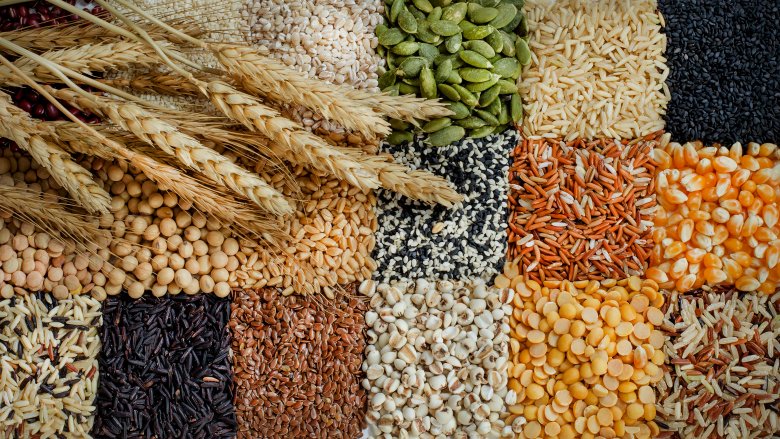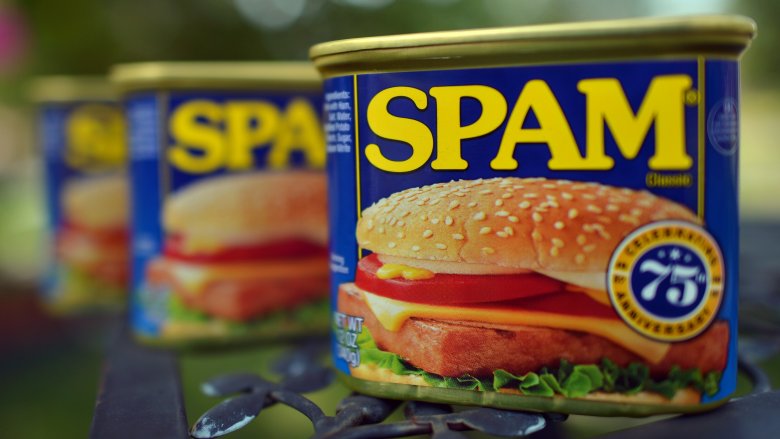Foods That Surprisingly Never Expire
The next time you go to the grocery store, you might notice something curious about how it's arranged: The outside of the store is filled with expensive foods that expire in a week or less, but as you head towards the center of the store, the expiration dates loom further and further into the future. In fact, many of the foods found here use a different type of grading altogether. Instead of telling you when they expire, manufacturers slap a "best-by" or "sell-by" date onto their products. That means you don't have to throw it away if you exceed the date — it's still safe to eat — but it may be past its prime in terms of quality and flavor.
Many of us stock our pantries with these staple foods, like cereal, pasta, and rice. Doomsday preppers go one step further and keep stores of it on hand. But you might be surprised to learn that many of these foods don't last forever: White rice is only good for four to five years (unless it's stored in an oxygen-free environment), and dried pasta only lasts for a few years. So what foods truly never (or almost never) expire? Here's what you can keep in your cupboards indefinitely — or at least a decade or two.
Honey is liquid gold that never expires
Honey is one of the few foods that really never expires. Technically, sugar also lasts forever, although its quality starts to deteriorate after two years. That's not the case with honey: Give it 20 years, 50 years, or 100 years, and it'll still taste the same way it did when you bottled it up. Don't believe it? National Geographic reported that archaeologists found 3,000-year-old pots of perfectly edible honey when unearthing Egyptian tombs. And yes, even crystalized honey is perfectly safe to eat.
What makes honey different from just about every other food on this list? For starters, it has a very low water content. Microbial growth requires water, which is why fresh fruits and vegetables expire so quickly. Combine that with honey's low pH, and you've got an environment where its nearly impossible for bacteria to grow. Finally, add in honey's antibacterial properties and the presence of hydrogen peroxide, and you have a product with an eternal shelf life.
Salt never expires (unless it's iodized)
There's a reason we've been using salt as a preservative for hundreds of years. Natural salt — meaning that it has no additives — will never go bad. Like honey, salt doesn't contain any water, preventing the conditions that cause food to spoil. And because salt isn't plant-based (it's a mineral extracted from seawater), it won't lose its flavor over time, either. If you store it correctly, salt will always taste like salt, no matter how old it is. That being said, anyone who lives in a humid environment will want to keep salt in an airtight container to prevent it from clumping up and absorbing water.
So why does some salt have a best-by date? It may have additives. Iodized salt was introduced in the 1920s to prevent thyroid conditions. Because iodine and other anti-caking agents that might be added to the salt do degrade, the shelf life of salt containing those additives is reduced to about five years. Some retailers also refuse to carry products without a sell-by date, so you may find a sticker slapped on your additive-free salt. As long as there's only one item on the ingredients list (salt), it should be safe to eat after that date passes.
Instant coffee might be foul, but it never expires
We can only think of a couple reasons to keep a package of instant coffee on hand: backwoods backpacking trips and doomsday prepping. Its portability can't be questioned, but few people know that instant coffee will stay fresh forever — even after opening the packaging. We use the word "fresh" here lightly, though, because it's made by drying a concentrated solution of pre-brewed coffee. The coffee extract is then spray-dried using hot air to transform the liquid into a fine powder, or it's frozen and dried under vacuum. Either way, once the process is finished, the coffee lacks any water that could lead to spoilage.
Consuming expired whole bean or ground coffee won't make you sick, but it also won't taste that great. Fresh coffee loses flavor pretty rapidly — as quickly as three months once you grind it or open the bag. In the case of very oily coffee beans, the grounds can also grow mold over time. Best to have the instant stuff on hand to get your caffeine fix if your regular coffee goes stale.
It might get weaker over time, but hard alcohol never expires
If your favorite vodka or whiskey is on sale at the local liquor store, you may want to stock up, because hard alcohol is one of those things that almost never expires. Even those dusty bottles at the back of your grandparent's liquor cabinet are likely still good to go. So long as it's pure alcohol and doesn't have any added ingredients (like fruit or cream liqueurs, or alcohol with mixers added in), it should last indefinitely.
That said, it might not look or taste quite the same as it did back in the day, especially if you've opened the bottle. Some alcohol will get weaker after a few decades, and it can also lose its flavor and change color. If the alcohol content drops below 25 percent alcohol, it can also become a breeding ground for yeast and bacteria. As a general rule of thumb, if it looks weird or smells funky, it might be time to toss it out.
Non-fat powdered milk lasts forever in the freezer
You might want to keep a package of non-fat powdered milk in your pantry for emergencies. This process starts by removing water from the milk and separating out the milk fats, the two components that can cause dairy to spoil. Then, the milk is dried using an evaporator to turn it into powder. It is easily reconstituted with water, and it will stay good for two to 10 years after its best-by date, especially if you store it in an airtight container. Keep the powdered milk in a cool place below 60 degrees F to extend the storage life even further. Pop it in the freezer, and it will last forever.
Rehydrated powdered milk won't taste as good as the fresh stuff, but it's super helpful to have some on hand. Add water to turn it into drinkable milk, or stir it directly into your coffee. You can also cook with it: Add it to ice cream to make it creamier, use it to thicken yogurt, or whisk it into soups and sauces to give them a rich finish.
Virgin coconut oil never really expires
There are various types of cooking oil, and they all have their pros and cons. When it comes to shelf life, though, coconut oil should be at the top of your list, because it lasts longer than most cooking oils. After two to three years past its best-by date, olive oil will go rancid, and vegetable oil only has about a year. Virgin or extra-virgin coconut oil, on the other hand, really never expires.
The key here is to make sure you're picking up unrefined coconut oil if you want it to last forever. That's because the refining process weakens the saturated fats' ability to stave off oxidation and makes the product susceptible to rancidity, especially if the oil has been expeller-pressed rather than cold-pressed, as heat also speeds up oxidation. Many people are attracted to refined coconut oil because of its neutral aroma and flavor, but it's only good for about 18 months. While unrefined oil has a very coconut-forward flavor, it also has a significantly longer shelf life. For some, that's totally worth it.
Soy sauce is fermented, so it never expires (if it's unopened)
Most of us don't think about soy sauce as we're drizzling it on our rice or mixing it with wasabi for sushi dunking, but it's actually a fermented product. Soy sauce starts as a combination of soy beans, wheat, salt, water, and yeast (toasted wheat gives the sauce a pleasing aroma and a sweet flavor). After the ingredients are cooked, an edible mold known as koji is introduced to the mash. A whole bunch of science follows, but in short: The koji converts starches into sugars and develops all kinds of complex flavors that make soy sauce so lovable.
Because of that fermentation process, and its high sodium content that prohibits microorganisms from growing, soy sauce is unlikely to spoil if it's unopened. Open the bottle, though, and the oxidation process starts immediately, which impacts the quality of fermented foods. It can darken in color and the flavor can intensify over time, too, so it'll taste best if you use it within six months of opening. Store it in the refrigerator, and you'll extend the life to two years.
Microwave popcorn expires, but loose kernels don't
That bag of buttery popcorn in the back of the pantry might go bad over time, but the loose kernels can last virtually forever. When it comes to the microwave packets, we can't recommend using them past the best-by date, as these products contain added oils and fats that can go rancid over time. The loose kernels, on the other hand, will last indefinitely if you store them in an airtight container or a cool, dry area.
There's one caveat here: You'll have a better chance of getting all the kernels to pop if they're fresh, and they'll transform into larger, fluffier pieces of popcorn when they're young, too. That makes them best consumed within about a year. If you find yourself having trouble getting older kernels to pop, don't toss them out — they may just need to be rehydrated. In What Makes Popcorn Pop?, David Woodside suggests adding a tablespoon of water to a few cups of popcorn kernels. Place the contents in a jar and shake it until the kernels absorb the water. Let them sit for a few days, then pop as normal.
Dried beans last indefinitely if they're stored right
Despite their flatulence-inducing properties, dried beans are an excellent source of protein, fiber, vitamins, and antioxidants, making them a great product to stock up on. And they can last indefinitely if stored in a cool, dry place. Sounds like a wonder food, right? When it comes to quality, though, decades-old beans may not be quite as good as fresh.
A study by Brigham Young University prepared 32-year-old pinto beans for a group of 58 people, and the beans still had an 80 percent acceptance rate for use in emergency situations when it came to taste and overall quality. Not only that, the study found that beans retain their protein content over time, making older varieties just as nutritious as the younger beans. But that's emergency situations, and you may be willing to eat sub-par beans.
When it comes to everyday cooking, conventional wisdom says that you probably don't want to store dried beans for longer than a couple years, and that's because older beans may never get as tender as freshly harvested beans, no matter how long you cook them. They'll definitely take longer to cook, so you should always soak older beans for at least 12 hours before cooking them, and you may want to add baking soda to the mix if your beans have been in the pantry for a while, as it will help to soften them.
Vinegar's shelf life is almost indefinite
Vinegar is one of those pantry ingredients that's always good to have on hand. It's used in cooking, it's a key ingredient in salad dressings, and using it to make pickles is an easy way to preserve food for later use. It also has a variety of household uses: Apple cider vinegar can be used as a hair rinse or mouthwash, and even turned into a multi-purpose cleaner. Consuming it may also have some health benefits.
The best part about vinegar? According to studies conducted by the Vinegar Institute, vinegar's shelf life is almost indefinite. It's also self-preserving because of its acidic nature, which means it never needs to be refrigerated. Over time, you may notice some color changes, the development of sediment, or a hazy feature in some types of vinegar, but these changes don't affect the safety of the acidic liquid itself. If they bother you, stock up on white distilled vinegar, which will remain completely unchanged over time.
Textured vegetable protein won't expire for 20 years or more
Textured vegetable protein (TVP) may not be as sexy as a beefy burger or a juicy chicken breast, but it lasts significantly longer than meat and it doesn't require any refrigeration. This soy-based meat alternative was invented in the 1960s as a "meat extender." Since it's a dehydrated product made from soybeans or soy flour, it has an unusually long shelf life. Store it in an oxygen-free environment, and it will last 15 to 20 years. Keep it at temperatures colder than 70 degrees Fahrenheit, and it will last longer than that.
Not sure how to use this high-protein, high-fiber food? It cooks up similar to ground meat, so you can use it as an inexpensive meat substitute in chili, casseroles, stews, or soups. If you want to go all in on plant-based cooking, try forming it into patties for veggie burgers or turning it into meatless meatballs.
Whole grains won't expire for up to 12 years
Surprisingly enough, flour doesn't last forever. All-purpose flour only has 10 to 15 months before it goes rancid, and wheat flour only lasts six to eight months (although both will keep indefinitely in the freezer). If you want to extend the shelf life to over a decade, you'll want to invest in a grain mill.
Hard grains like wheat, buckwheat, millet, and spelt are good for 10 to 12 years when stored whole in an oxygen-free environment. Once you grind the grain, you remove that built-in protection. Without its hard outer shell, the germ of the seed has nothing to keep it from releasing its volatile oils, and over time those oils will turn rancid and create off flavors. Soft grains still have a pretty long shelf life, too — you can expect about eight years of storage from quinoa, oats, and barley — but their soft outer shell doesn't protect the seed as well as the hard varieties.
Spam lasts many years past its best-by date
Spam was introduced to the world in 1937, and it only took a few short years for it to become a household staple. During World War II, Hormel estimates that more than 100 million pounds of Spam was shipped abroad to feed Allied troops, and they've sold over 8 billion cans to date. What makes people love Spam so much? It's a ready-to-eat, shelf-stable, inexpensive meat product, and it actually tastes pretty good, too.
Despite the common misconception that Spam lasts forever, Hormel recommends eating it by the "best by" date stamped on the can to enjoy it at its best quality. Like other canned meats, you can usually go two to five years after that date as long as the can isn't bulging. There are die-hard preppers debating the value of 30-year-old cans of Spam, and some sound willing to give it a whirl if necessary. Personally, we wouldn't dig into a can that old, but apparently a 100-year-old tin of veal that was analyzed and found to be perfectly good was fed to a cat in the late 1930s. Apparently, the cat didn't complain, so maybe it's fine.
